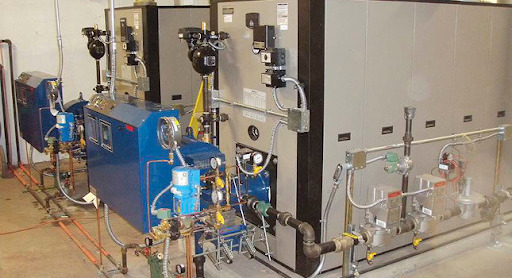In several regions worldwide, boilers are used to adjust the home’s temperatures when extreme weather conditions hit. The unbearably chilled environment makes it hard for individuals to dwell comfortably in their homes; furnaces and boilers are two of the widely used heating equipment helpful for warming up a home. It is must-have equipment in winter and is useful in generating appropriate heat for a comfortable environment. If you are planning to get one for your home, you must familiarise yourself with the use of boilers, boiler controls, and what to look for in a residential boiler.
Table of Contents
Explore more about boilers
Working on a boiler
Boilers are used to produce hot water or steam using a water-heating mechanism inside a tank. In extremely low temperatures, these boilers can help you live in a comfortable environment inside the home.
In a typical boiler, the upper part of the equipment is filled with water, and the lower part, called a burner, heats up the water. Different types of fuels can be used to produce heat through the burner. The commonly used fuel types in boilers are electricity, gas, and oil. It has been found that most people prefer using natural gas as a fuel source in urban areas. On the other hand, in rural areas, propane gas is used. Natural gas is considerably cheaper than propane gas. While purchasing a boiler, one should know the suitable type of boiler he is looking for. Let’s explore more about the types of available boilers in the market.
Different types of boilers
The popularly used boilers are mainly of two types, one is a steam boiler, and the other is a hot water boiler.
Steam boiler: As the name suggests, a steam boiler produces steam out of the water and radiates it to the entire house.
Hot water boilers: In this type of boiler, water is heated and supplied throughout the home using radiators. Some of these boilers are useful for producing hot water for other uses such as cooking and bathing. This eliminates the need for separate equipment to be used for multiple functions.
A system that has better efficiency is likely to reduce the cost of fuel used in the boilers. Thus, when buying a boiler, you must consider its efficiency and how much fuel it may consume. Boilers are categorized into two types when it comes to efficiency- Standard and high-efficiency boilers. Standard boilers are available at cheaper rates as compared to high-efficiency boilers. However, high-efficiency boilers have an efficiency of more than 90% and help you save on long-term costs.
Another difference between high and standard boilers is that in the standard boilers, energy or heat is lost during the process. In contrast, an efficient boiler reserves the heat and uses it to warm the home. Therefore, fuel consumption is low in the high-efficiency boiler and considerably high in the other one.
When a boiler becomes old, its efficiency decreases to a low level of 50-70%. This concludes that the rest of the 30-50% of the energy is being wasted.
Though the high-efficiency boilers lower fuel wastage, the initial purchase cost is higher than other boilers. Moreover, a huge amount is required to retrofit the house for a high-efficiency boiler. The maintenance and installation may also require an extra bunch of money due to the use of advanced technology in these boilers.
Final thoughts
Residential boiler controls are a life-savior technology that offers a warm ambiance in areas with extremely low temperatures. Many companies are manufacturing boilers with different features, costs, and functionality. Before purchasing one, you must know the one that will suit your needs.















